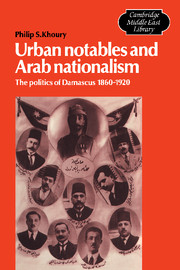Book contents
- Frontmatter
- Contents
- List of maps
- Note on transcription
- Preface
- Introduction
- 1 The political configuration of Damascus in 1860
- 2 The consolidation of leadership in Damascus after 1860
- 3 Damascus notables and the rise of Arab nationalism before World War I
- 4 Notables, nationalists and Faysal's Arab government in Damascus, 1918–20
- Conclusion
- Notes
- Bibliography
- Glossary of Arabic, Persian and Turkish terms
- Index
3 - Damascus notables and the rise of Arab nationalism before World War I
Published online by Cambridge University Press: 14 October 2009
- Frontmatter
- Contents
- List of maps
- Note on transcription
- Preface
- Introduction
- 1 The political configuration of Damascus in 1860
- 2 The consolidation of leadership in Damascus after 1860
- 3 Damascus notables and the rise of Arab nationalism before World War I
- 4 Notables, nationalists and Faysal's Arab government in Damascus, 1918–20
- Conclusion
- Notes
- Bibliography
- Glossary of Arabic, Persian and Turkish terms
- Index
Summary
Following the 1860 events, but particularly after the commercial depression of the 1870s which had aggravated tensions between the Ottoman central authority and the local leadership in Damascus, the Syrian Province of the Ottoman Empire ‘enjoyed a measure’ of tranquility and prosperity absent in the first half of the century. Pacification throughout Greater Syria was carried out through the implementation of widespread modernization schemes. Roads, railways and telegraphs improved the transportation and communications network linking Syria to Iraq and Arabia, and to Istanbul. Rural security improved as beduin tribes were encouraged to settle in greater numbers. Agricultural production and rural population grew in many districts as the margins of cultivation were pushed eastward. Even some hardpressed industries began to enjoy a revival by finding increased demand in the towns and countryside. Regional and international commerce continued to expand. Modern elementary, secondary, technical and military schools, departments of justice, and a modernized gendarmerie were other derivatives of the consolidation and extension of reforms stemming from Istanbul during the reign of Sultan ‘Abd ul-Hamid II.
In Damascus and other Syrian towns, an ascendant landowning-bureaucratic class benefited from the series of modernizing reforms. This class came to identify with the ideology of Ottomanism and emerged as the agent of Ottoman centralization and modernization. The urban notables aligned with and defended the policies emanating from Istanbul fully cognizant that obstruction no longer served their interests.
- Type
- Chapter
- Information
- Urban Notables and Arab NationalismThe Politics of Damascus 1860–1920, pp. 53 - 74Publisher: Cambridge University PressPrint publication year: 1983
- 1
- Cited by



